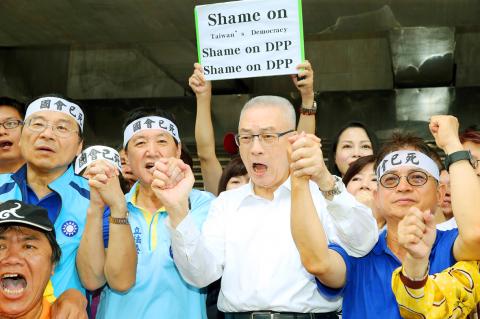Chinese Nationalist Party (KMT) legislators Lai Shyh-bao (賴士葆), Alex Fai (費鴻泰) and William Tseng (曾銘宗) yesterday continued their hunger strike in protest against what they said was the Democratic Progressive Party’s (DPP) “autocratic” handling of the motions tendered by opposition lawmakers for the Forward-looking Infrastructure Development Program.
The lawmakers started their hunger strike at 8pm on Tuesday after Legislative Speaker Su Jia-chyuan (蘇嘉全), a DPP member, announced that there would be no voting on the same issue twice.
The KMT caucus said that if the rule of no voting twice on the same issue were followed, only the 101 motions tendered by the DPP, which controls the legislature, would be voted on, while motions filed by other caucuses would be ditched, which would be undemocratic and against the law.

Photo: CNA
Sitting on the stairs at the side entrance of the Legislative Yuan in Taipei, the three men vowed to fast for 50 hours until the extraordinary session ends today, drinking only water as sustenance.
“How will we end up as after 50 hours? I dare not say, but I hope that we can raise people’s awareness that this country is gradually becoming a dictatorship, that it is becoming like Germany under Hitler,” Lai said.
“Have you seen Legislative Speaker Su Jia-chyuan’s bossy attitude? He thinks that just because he has a bigger fist, he can hit his opponents down,” Lai said, referring to the DPP’s legislative majority.
Former legislative speaker Wang Jin-pyng (王金平) and former Taipei County commissioner Chou Hsi-wei (周錫瑋), members of the KMT, yesterday visited the three lawmakers and expressed their solidarity with them.
“The DPP’s assertion that ‘the same issue should not be voted on twice’ is based on distorted interpretations of the legislative procedure provided by Su’s aides,” Wang said.
“It will allow the budget to be arbitrarily pushed through with a majority vote,” he said, adding that Su’s handling of the proceedings would likely have repercussions on the legislature’s future operations.
Chou urged the DPP to contemplate whether doling out such large sums for the infrastructure program would really help boost the nation’s competitiveness and economic growth.
“If DPP lawmakers force the budget through with its [majority] vote, the public will decide through the ballot box whether to allow the DPP to remain in power,” Chou said.
KMT Chairman Wu Den-yih (吳敦義) on Tuesday night visited the three lawmakers, saying that he “sympathizes with them and supports their hunger strike.”
Su said he respects Wang as a veteran politician, but asked whether Wang spoke according to his conscience.
The way legislative motions are addressed was approved by officials at the legislature’s Conference Department based on practices with which the KMT dealt with motions when it held the legislative majority, Su said.
Meanwhile, DPP Legislator Wang Ding-yu (王定宇) mocked Tseng for saying he was ready to risk “self-injury” by not eating for five hours.
Tseng made the remark when he went live on Facebook on Tuesday night before starting the hunger strike.
“I never knew that not eating for five hours is a form of self-injury. It just occurred to me that I have been inflicting harm on myself for more than 40 years,” Wang said on Facebook.

Chinese Nationalist Party (KMT) Chairman Eric Chu (朱立倫), spokeswoman Yang Chih-yu (楊智伃) and Legislator Hsieh Lung-chieh (謝龍介) would be summoned by police for questioning for leading an illegal assembly on Thursday evening last week, Minister of the Interior Liu Shyh-fang (劉世芳) said today. The three KMT officials led an assembly outside the Taipei City Prosecutors’ Office, a restricted area where public assembly is not allowed, protesting the questioning of several KMT staff and searches of KMT headquarters and offices in a recall petition forgery case. Chu, Yang and Hsieh are all suspected of contravening the Assembly and Parade Act (集會遊行法) by holding

PRAISE: Japanese visitor Takashi Kubota said the Taiwanese temple architecture images showcased in the AI Art Gallery were the most impressive displays he saw Taiwan does not have an official pavilion at the World Expo in Osaka, Japan, because of its diplomatic predicament, but the government-backed Tech World pavilion is drawing interest with its unique recreations of works by Taiwanese artists. The pavilion features an artificial intelligence (AI)-based art gallery showcasing works of famous Taiwanese artists from the Japanese colonial period using innovative technologies. Among its main simulated displays are Eastern gouache paintings by Chen Chin (陳進), Lin Yu-shan (林玉山) and Kuo Hsueh-hu (郭雪湖), who were the three young Taiwanese painters selected for the East Asian Painting exhibition in 1927. Gouache is a water-based

Taiwan would welcome the return of Honduras as a diplomatic ally if its next president decides to make such a move, Minister of Foreign Affairs Lin Chia-lung (林佳龍) said yesterday. “Of course, we would welcome Honduras if they want to restore diplomatic ties with Taiwan after their elections,” Lin said at a meeting of the legislature’s Foreign Affairs and National Defense Committee, when asked to comment on statements made by two of the three Honduran presidential candidates during the presidential campaign in the Central American country. Taiwan is paying close attention to the region as a whole in the wake of a

OFF-TARGET: More than 30,000 participants were expected to take part in the Games next month, but only 6,550 foreign and 19,400 Taiwanese athletes have registered Taipei city councilors yesterday blasted the organizers of next month’s World Masters Games over sudden timetable and venue changes, which they said have caused thousands of participants to back out of the international sporting event, among other organizational issues. They also cited visa delays and political interference by China as reasons many foreign athletes are requesting refunds for the event, to be held from May 17 to 30. Jointly organized by the Taipei and New Taipei City governments, the games have been rocked by numerous controversies since preparations began in 2020. Taipei City Councilor Lin Yen-feng (林延鳳) said yesterday that new measures by